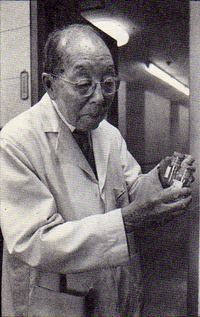
Dr. Kanematsu Sugiura
[back]
Laetrile
REMEMBERING DR. SUGIURA by Ralph
Moss
"I write what I see," he said repeatedly. "Laetrile is not a cure for cancer, but a good palliative drug." REMEMBERING DR. SUGIURA by Ralph Moss
Basically the attitude was best expressed by Lewis Thomas, the president of the centre, who told my boss, as he would not see me, "I am not going to die on the barricades
for Laetrile. It is not a cure, it is only a palliative, (meaning it relieves pain and stops the spread of cancer), if it were a cure it might be a different story, but I am not going to give up my career, to die on the barricades". That's how they justified it in their own minds. I could not do that, nor could Dr Sugiura, who never renounced the results of his own studies, despite the fact they put enormous pressure on him to do so.Certainly one story that needs to be told is that of Dr. Kanematsu Sugiura. In 1975, Dr. Sugiura was, and had been for some years, one of the most respected cancer research scientists at Sloan-Kettering. In working with cancerous mice, Dr. Sugiura found that, when he used Laetrile on these mice, seventy-seven per cent of them did not develop a spread of their disease (metastatic carcinoma). He repeated this study over and over for two years. The results were always the same. Dr. Sugiura took his findings to his superiors at Sloan-Kettering, but his study was never published. Instead, Sloan-Kettering published the results of someone else who claimed that he had used Dr. Sugiura's protocol. This "someone else's" study showed that there were no beneficial effects from the use of Laetrile. Dr. Sugiura complained. He was fired. A book was written about all of this entitled The Anatomy of A Cover-up. This book has all the actual results of Dr. Sugiura's work. These results do, indeed, show the benefit of Laetrile. Dr. Sugiura stated in this book, "It is still my belief that Amygdalin cures metastases." Amygdalin is, of course, the scientific name for Laetrile. ALIVE AND WELL by Philip E. Binzel, Jr., M.D.
“Here’s what happened. They began a series of tests on Laetrile and they turned it over to their top laboratory technician Dr. Kanematsu Sugiura, a Japanese fellow, he was sort of at the end of his career. He was very well known, held at high esteem by all of his associates. He was mr laboratory test. Whatever Sugiura said, went, for everybody, so they gave it to Sugiura. Sugiura ran his tests and this was his report. He came to five conclusions. Fist of all, he said, it improved the general health of the mice that he was using. Secondly it appeared to relieve their pain. Thirdly it inhibited the growth of tumors. Fourth it stopped the spread of tumors.. and five it acted as a cancer prevention. That was his official finding. And at the end of this report, this is a quote ‘ Dr has never observed complete regression of these tumors in all his cosmic experience with other chemotherapeutic agents’ end quote.”.....“Congressman John Kelsey used the Freedom of Information Act to obtain a copy of the minutes of the board of directors of Sloan Kettering dated July 2nd 1974. And from the minutes it said quote ‘Sloan Kettering is not enthusiastic about studying Amygdalin, but would like to study cyanide releasing drugs.’ end quote. Now if you understand that sentence you understand everything that I’m talking to you about today.” [G. Edward Griffin] The Science and Politics of Cancer A discourse by G. Edward Griffin